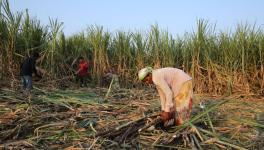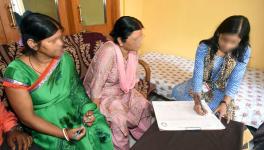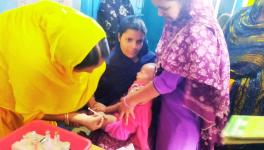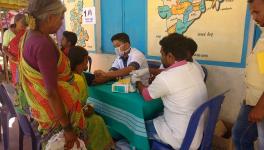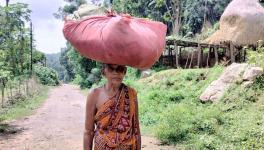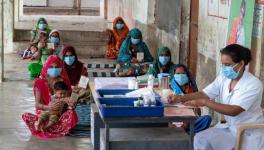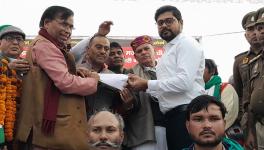Why Anganwadi and ASHAs are Essential Workers and not Volunteers
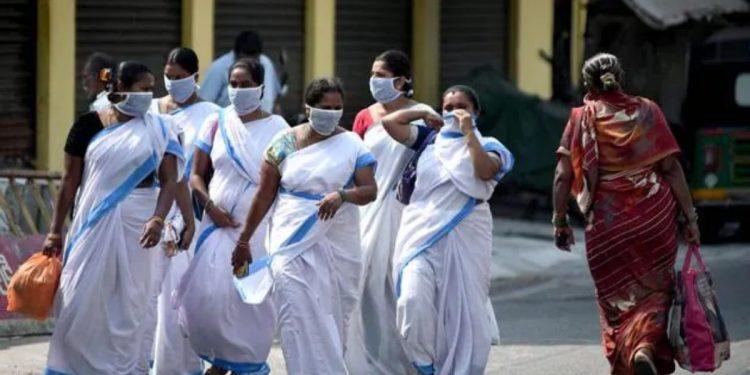
Shedding light on the exploitative legal status of Anganwadi workers and Accredited Social Health Activists (ASHAs), who are technically volunteers and therefore paid an honorarium below the minimum wage but treated as workers when it comes to contesting local elections and managing the State’s on-ground pandemic response, SUCHITA KRISHNAPRASAD makes the case for classifying them as essential workers.
—-
Approximately 14 lakh women serving under as Anganwadi workers (AWW) under the Integrated Child Development Services Scheme, which is the world’s largest community-based programme for child development, and another nine lakh women working as Accredited Social Health Activists (ASHA) under the National Rural Health Mission, have been battling for decades to be recognised as workers.
Recruited from the same underprivileged communities they serve, they remain astonishingly committed to their work, despite their heavy workload, delayed payments, and Dickensian working and living conditions. Spread across India, they receive honorariums, of which a fixed component is sanctioned by the Union government, along with a state government component that varies across the states.
Interestingly, this differential has not deterred their unionisation. Arguably, this might be the largest unionised workforce in India, with more female representation in its leadership than any other union.
As volunteers, and not workers, they are not entitled to a wage, and their honorarium is below the minimum wage.
These ‘volunteers’ are looked upon as ground-level repositories of information on community health essential for policy formulation. Since the onset of the COVID-19 pandemic, they have performed crucial nodal tasks, despite scant availability of protective equipment, in tracing and tracking the spread of the infection, reaching provisions to the disadvantaged during the lockdowns, convincing the communities against the ostracism of the infected, and spreading awareness about COVID vaccines. Their job as COVID warriors re-emphasises the need to recognise them as workers.
However, the logical inconsistencies at play in understanding the status of these women have a long history.
Also read: ASHA and Anganwadi Workers Are the Backbones of India’s Rural Health and Care Services
Bar to becoming elected representatives
Their commitment towards their communities has been validated through victories in the local body elections in the past. However, they have had to step down once elected, either over the issue of ‘office of profit’ or through instructions from the State Election Commissioner to that effect. Even as the Supreme Court quashed such rulings, High Courts have continued to opine that acting as elected members would hamper their functioning as AWW. Even the Panchayat Raj Acts in certain States disqualify AWWs and ASHAs from contesting elections, and AWWs have to resign in order to file their nominations.
Banning them from contesting elections is clearly inconsistent with their status as ‘volunteers’. Curiously, only in the cases of employment disputes related to AWWs have the Courts preferred to recognise ICDS as an ‘industry’ and AWWs as ‘workers’. If their work as elected members of local bodies is likely to hamper their work as AWWs, they cannot be categorised as part-time workers as per a clarification given by the union government to the International Labour Organization.
Payment by incentive
A performance-linked incentive of Rs. 250 per month to AWHs was introduced effective from October 2018, apart from a similar incentive of Rs. 500 per month being available for using ICDS-Common Application Software under the POSHAN Abhiyaan. ASHAs also receive an honorarium that is contingent on their performance. Since it is a worker who performs, while a volunteer only serves, shouldn’t a payment based on performance be termed as a wage, and the women receiving this amount be classified as workers?
Also read: Fair wage is about rights of anganwadis, so why are ASHA workers denied minimum wages, benefits?
On becoming a worker
It has been amply argued that deploying women for care work on abysmally low payment while valorising their gumption as maatrushakti (motherly power) is redolent of a gender politics that plugs neatly into the patriarchal worldview, enabling the authorities to extract more services paid only through epitaphs and not rightful dues.
As workers, these women would be entitled to timely payment, minimum wages, dearness allowance, and retrenchment benefits. Bonus will come as a right, and not charity or bhaubeej (a typical Indian Hindu tradition in which brothers gift their sisters during Diwali) as it currently does. Their premises might also come under the ambit of labour inspection, to ensure safety and better facilities.
However, as workers, would they be categorised as government employees or industrial workers? A prohibition from contesting elections indicates that they could be viewed as quasi-government workers. On the other hand, courts have already viewed ICDS as an industry.
Since various government schemes are implemented by these women, their unions demand the status of government workers. As government servants, there will be a further entitlement in terms of retirement benefits and pay revisions. But, if ICDS is deemed an industry, they will be considered industrial workers and their benefits would differ accordingly. Note that Anganwadi centres are already run in a Private-Public partnership mode in some parts of the country.
However, in the light of recent labour reforms that envisage several new categories of temporary workers, besides dilution of standing orders, and changes in the norms defining the legitimacy of a strike, among other things, being granted the status of a worker may bring little cheer.
Instead, it would be more appropriate to recognise them as providers of essential services.
Also read: Among Reasons That Forced ASHAs to Strike: No Safety Gears, Pending Wages
Essential Services
AWWs and ASHAs are essential service providers and not Samaritans whose services are needed only sporadically. It hurts the society when these women go on strike, which is why the Maharashtra government even applied the Maharashtra Essential Services Maintenance Act to prohibit stoppage of work by AWWs, though the order was quickly revoked under political pressure.
Those who were expected to report to work when everyone was advised to ‘Stay Home and Stay Safe’ due to the pandemic, can only be Essential Workers. During the pandemic, their honorarium was slashed for not reporting to work; a practice one usually associates with workers and not volunteers.
Lastly, with all the additional duties given to them during COVID, ASHAs and AWWs have certainly not been working ‘part-time’ for the last fifteen months.
As rural India gears up for the third wave of the pandemic, an effective engagement with AWWs and ASHAs would be crucial in building support networks. They will need to be deployed not only to manage the state’s pandemic response, but also the several parallel pandemics that COVID and its ramifications have created: the steep hike in domestic violence, mental health issues, school drop outs rates, child marriages, unplanned childbirths, infant and maternal mortality, and malnourishment among children.
People who are expected to provide this kind of community healing are necessarily professional workers, and essential workers at that, not volunteers.
(Dr. Suchita Krishnaprasad is a former Associate Professor and Head of Economics Department at Elphinstone College, Dr. Homi Bhabha State University, Mumbai. The views expressed are personal.)
Get the latest reports & analysis with people's perspective on Protests, movements & deep analytical videos, discussions of the current affairs in your Telegram app. Subscribe to NewsClick's Telegram channel & get Real-Time updates on stories, as they get published on our website.









